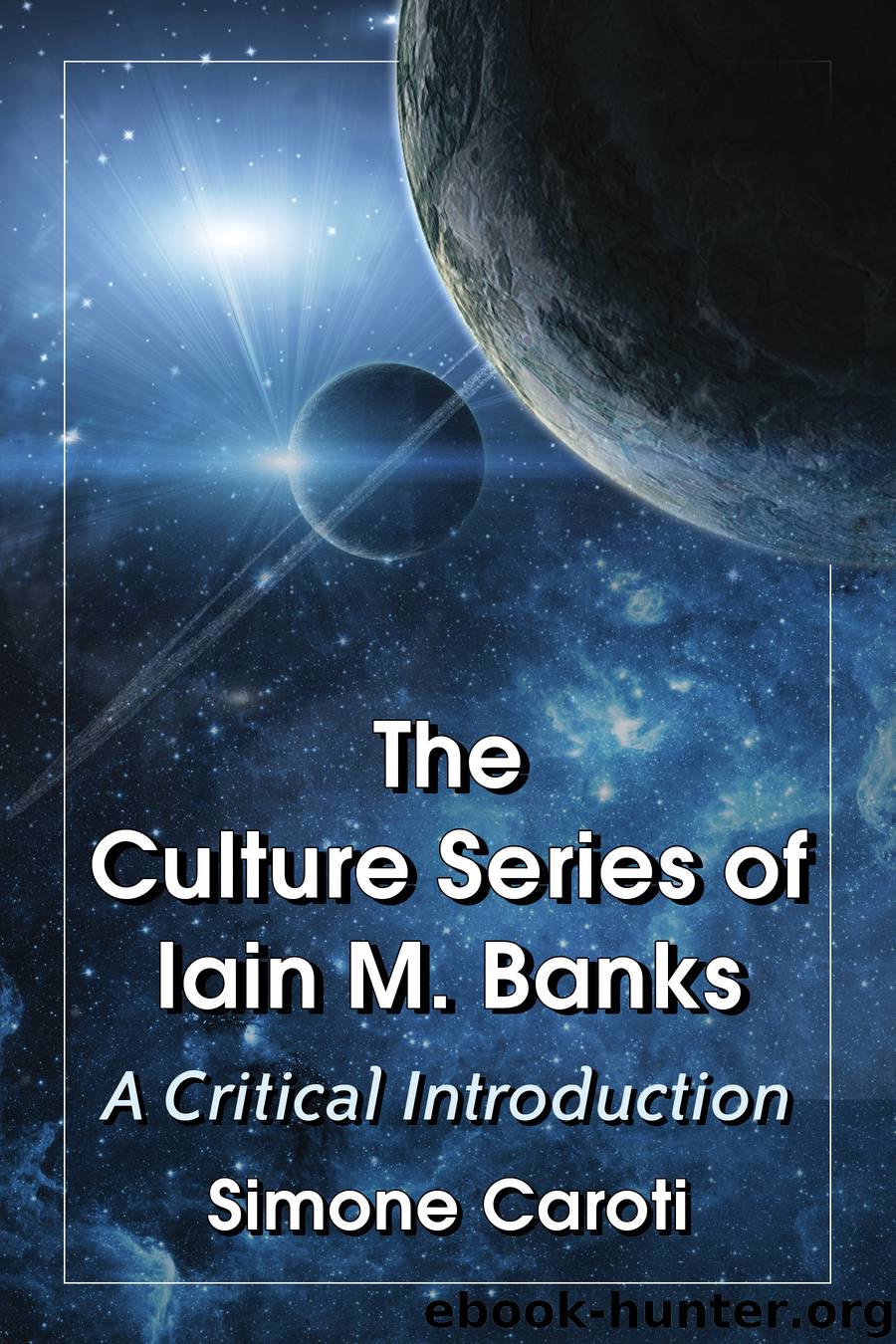The Culture Series of Iain M. Banks by Simone Caroti

Author:Simone Caroti
Language: eng
Format: epub
Publisher: McFarland
Published: 2015-04-09T16:00:00+00:00
Excession and Inversions
The first four Culture books were space operas of the planet-focused persuasion. The stories featured plenty of ships and plenty of Minds inside them, but the majority of the action and the entirety of the focus were on events taking place on planets or Orbitals. The gaze of Excession (1996), on the other hand, is aimed straight up and out. For the first time in the history of the Culture, Excession presents us with the transcendental view, with spacescapes seen from the perspective of the godlike, and the panorama is vast. “Vertiginous shifts in scale are Banks’ specialty,” Faren Miller wrote in her Locus review of the novel. “If you can hang in there without getting too horrendously dizzy, Excession will satisfy on many counts and levels, even (at last) the cosmic” (1996, 27). Miller’s parenthetical statement is telling—that “at last,” whose feel of delayed satisfaction points to Banks’ long-awaited decision to finally break his starships out into the great beyond.
Reading Excession is a joy. The novel soars on a giddy combination of descriptive grandeur, linguistic complexity, purposeful chaos, constant deconstruction and reconstruction of the space-opera template, exciting action, plenty of explosions, grand vistas of impossible things, and finally gargantuan ships—which means Minds, because this is a novel that the Minds and the vessels they control can inhabit without claustrophobia. Space is open to Minded sight, nearly transparent before the gaze of AI. Excession has the same vast canvas and the same basic plan—to deconstruct space opera and rebuild it in a new shape—as Consider Phlebas, but the hand that controls the process, deft and purposeful where before it had been somewhat uncertain of itself, has finally put into play the only entities capable of bringing home to us the true scope of the Culture universe—capable, that is, with the assistance of “that staple of SF: a mysterious artifact” (Miller 1996, 25–27), whose appearance triggers the onset of what the Culture terms an Outside Context Problem:
The usual example given to illustrate an Outside Context Problem was imagining you were a tribe on a largish, fertile island; you’d tamed the land, invented the wheel or writing or whatever, the neighbors were cooperative or enslaved but at any rate peaceful and you were busy raising temples to yourself with all the excess productive capacity you had, you were in a position of near-absolute power and control which your hallowed ancestors could hardly have dreamed of and the whole situation was just running along nicely like a canoe on wet grass … when suddenly this bristling lump of iron appears sailless and trailing steam in the bay and these guys carrying long funny-looking sticks come ashore and announce you’ve just been discovered, you’re all subjects of the Emperor now, he’s keen on presents called tax and these bright-eyed holy men would like a word with your priests [71–72].
Download
This site does not store any files on its server. We only index and link to content provided by other sites. Please contact the content providers to delete copyright contents if any and email us, we'll remove relevant links or contents immediately.
| African | Asian |
| Australian & Oceanian | Canadian |
| Caribbean & Latin American | European |
| Jewish | Middle Eastern |
| Russian | United States |
4 3 2 1: A Novel by Paul Auster(12352)
The handmaid's tale by Margaret Atwood(7725)
Giovanni's Room by James Baldwin(7293)
Asking the Right Questions: A Guide to Critical Thinking by M. Neil Browne & Stuart M. Keeley(5734)
Big Magic: Creative Living Beyond Fear by Elizabeth Gilbert(5720)
Ego Is the Enemy by Ryan Holiday(5383)
The Body: A Guide for Occupants by Bill Bryson(5060)
On Writing A Memoir of the Craft by Stephen King(4908)
Ken Follett - World without end by Ken Follett(4701)
Adulting by Kelly Williams Brown(4549)
Bluets by Maggie Nelson(4533)
Eat That Frog! by Brian Tracy(4497)
Guilty Pleasures by Laurell K Hamilton(4416)
The Poetry of Pablo Neruda by Pablo Neruda(4077)
Alive: The Story of the Andes Survivors by Piers Paul Read(4009)
White Noise - A Novel by Don DeLillo(3987)
Fingerprints of the Gods by Graham Hancock(3974)
The Book of Joy by Dalai Lama(3956)
The Bookshop by Penelope Fitzgerald(3826)
